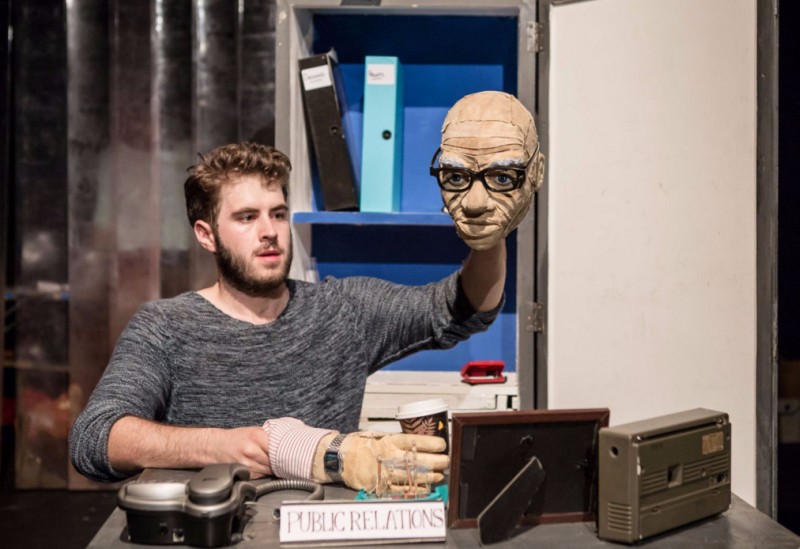 Against a backdrop of thick plastic vertical strips, Smoking Apples tell a tale of the fishing industry using performance, visual theatre, and puppetry. Not a single line of dialogue is spoken on stage, although some text is delivered through the media of answering machine messages and radio broadcasts. The main part of the narrative is conveyed either through scenes where human characters interact with puppet characters presented as disembodied heads and hands, or through clever uses of scenery, props, toys, and other devices to create miniature scenes of ships on the water, cars and trucks driving and delivering cargo, or brief shadow puppetry presentations.
Against a backdrop of thick plastic vertical strips, Smoking Apples tell a tale of the fishing industry using performance, visual theatre, and puppetry. Not a single line of dialogue is spoken on stage, although some text is delivered through the media of answering machine messages and radio broadcasts. The main part of the narrative is conveyed either through scenes where human characters interact with puppet characters presented as disembodied heads and hands, or through clever uses of scenery, props, toys, and other devices to create miniature scenes of ships on the water, cars and trucks driving and delivering cargo, or brief shadow puppetry presentations.
All the main characters are puppets – the grizzled old fishing captain in financial trouble but loved by his human crew mates, the captain’s son who has fled the family business to work in PR in the city, and the small young seagull that never quite manages to snatch that tasty treat. The team of five performers work as an ensemble to create scenes and present transformations in the style of crew mates at sea – all knowing their job, sometimes having a bit of a laugh, sometimes in total concentration. Most of the scenes are brief, and the whole performance comes across as a cleverly connected series of vignettes that both explain a bit about the fishing industry and tell the story of how the drink-dependent father and worried, guilty son, both mourning the loss of their wife/mother, confront the pressing financial issues that threaten fishing.
The dramaturgy, sound design, and set design are all strong and consistent. The plot is mostly clear and the pre-recorded spoken text supports the dialogue-free performance. Smoking Apples are wonderfully and playfully inventive when it comes to making visual effects, and are committed to the puppetry, which they use to good effect. The device of a head and hand operated by one puppeteer (Matthew Lloyd for Alf and Luke Breen for Ben), occasionally supported by an extra hand operated by another puppeteer (Molly Freeman for Alf) demands a high level of precision which wasn’t always there, and when the two puppet characters have scenes together the inability to speak becomes an issue rather than an asset, which is a testament to the power of the piece. We believe in and care about the father and son, and we want to see and hear the emotions in their confrontations.
Smoking Apples are visually inventive and playful, willing to take the time and effort to create a satisfying piece of theatre, and are developing their own trademark style. In Our Hands illuminates the world of fishing in a remarkably original and unique way.
